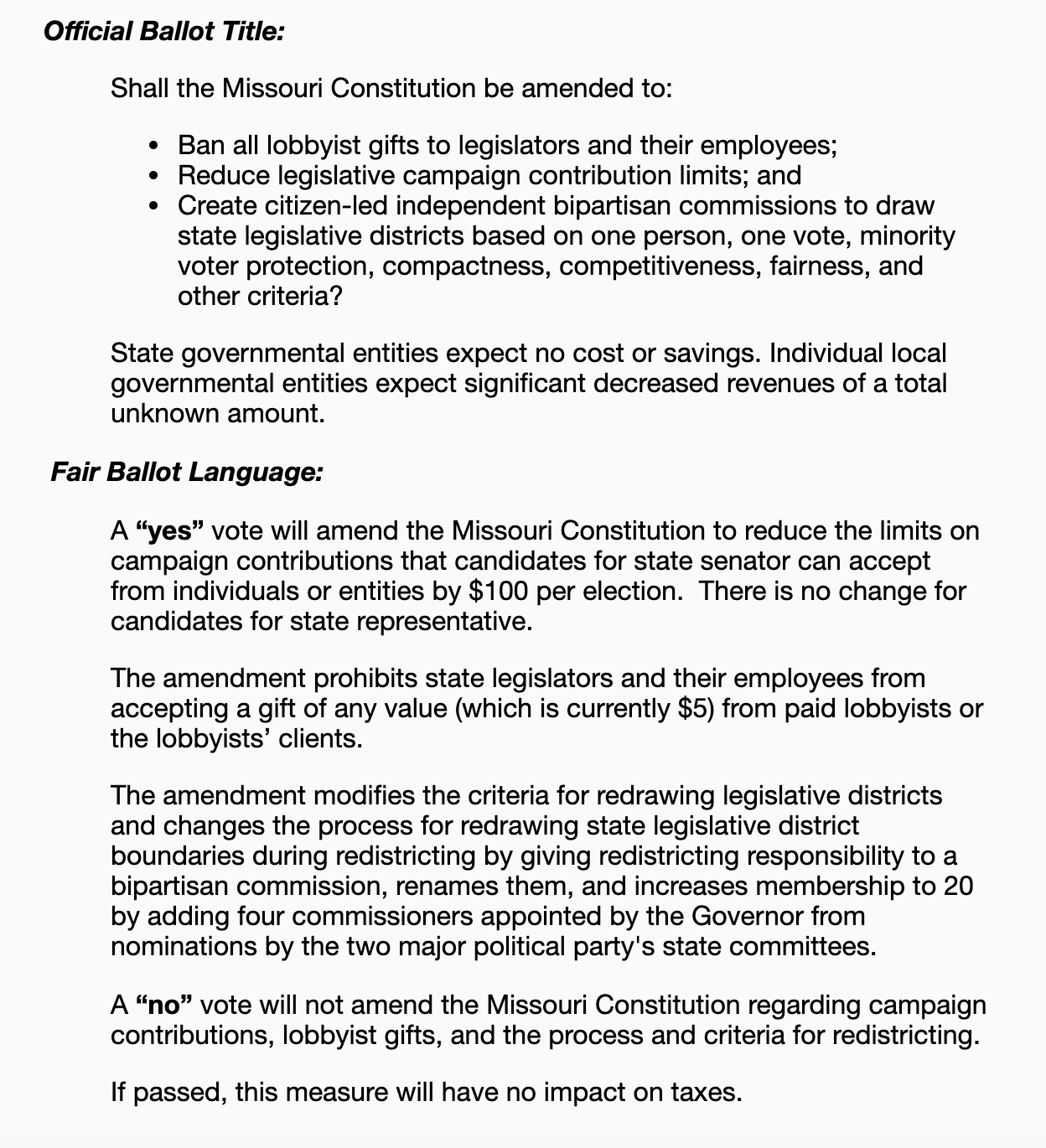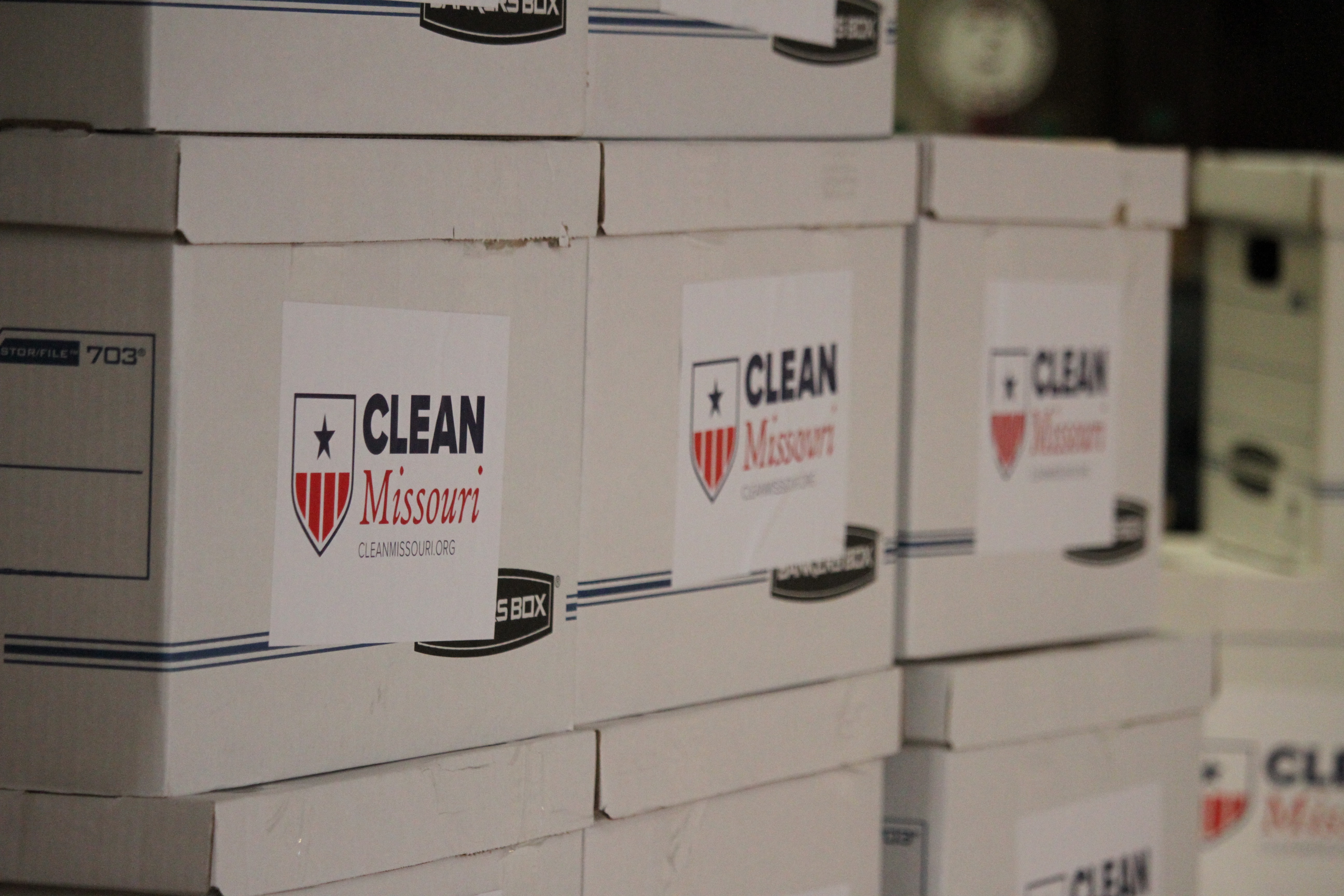JEFFERSON CITY, Mo. — Redistricting ballot language before voters in November will look different from what the Missouri Legislature originally drafted following changes made by a Cole County Circuit Court judge.
Circuit Judge Patricia S. Joyce called the General Assembly’s drafted language for SJR 38 “misleading, unfair, and insufficient” in her judgment Monday. The contentious legislation, which passed out of the legislature in May, would make changes to the voter-approved Clean Missouri, implement a ban on certain lobbyist gifts to legislators, and lower Senate campaign contribution limits if approved in November. It also includes provisions on redistricting.
“[T]he legislature’s summary fails to inform voters that adopting SJR 38 would eliminate the legislative redistricting rules Missourians overwhelmingly adopted just two years ago to combat political gerrymandering and replace them with a redistricting process similar in substance to the one they just voted to abandon,” the judgment said. “The legislature’s summary instead seeks to entice voters to adopt the measure by misleadingly overstating a modest $5 reduction in allowable lobbyist gifts and a $100 reduction to Senate campaign contribution limits. Where, as here, the legislature seeks to override the recent, clearly expressed will of Missouri voters on a matter as important as redistricting, the law requires that voters be plainly informed what they are being asked to consider.”
“The ‘central purpose’ or ‘primary objective’ of SJR 38 is to effectively repeal Amendment 1. Accordingly, the summary statement must alert voters to that change in some fashion. Instead, the General Assembly’s statement does not mention the change at all. It is insufficient, unfair, and must be rewritten.”
The original summary as drafted by the General Assembly read:
Shall the Missouri Constitution be amended to:
-
- Ban all lobbyist gifts to legislators and their employees;
-
- Reduce legislative campaign contribution limits; and
-
- Create citizen-led independent bipartisan commissions to draw state legislative districts based on one person, one vote, minority voter protection, compactness, competitiveness, fairness and other criteria?
The judgment changed the summary statement to:
Shall the Missouri Constitution be amended to:
-
- Repeal rules for drawing state legislative districts approved by voters in November 2018 and replace them with rules proposed by the legislature;
-
- Lower the campaign contribution limit for senate candidates by $100; and
-
- Lower legislative gift limits from $5 to $0, with exemptions for some lobbyists?
The measure has been certified as Amendment 3 by the Secretary of State’s Office.
“Politicians may lie to our faces about what they’re trying to do do with Amendment 3, but they can’t lie in what appears on the ballot,” Sean Soendker Nicholson, campaign director for the No on Amendment 3 campaign, said. “Everyone needs to understand that politicians are trying to trick voters by hiding a deceptive gerrymandering plan in the state constitution. The whole of their plan is to protect incumbent politicians in rigged maps drawn in back rooms by lobbyists and political operatives.”
Representatives for Secretary of State Jay Ashcroft and Sen. Dan Hegeman, who sponsored the legislation, did not immediately respond to a request for comment. Both were named in the suit along with Senate President Pro Tem Dave Schatz and House Speaker Elijah Haahr.

Approved by voters in November 2018 as the Amendment 1 ballot measure, Clean Missouri tackled a myriad of issues in state government, from establishing a new redistricting process to limiting lobbyist gifts to lawmakers and more.
Amendment 1 changed the state’s redistricting process to require a new nonpartisan state demographer to draw legislative maps for the General Assembly following the 2020 U.S. Census. It also enacted ethics reform, such as placing a $5 limit on lobbyist gifts to lawmakers.
Aside from lobbyist gifts and campaign contribution limits, SJR 38 sought to change how the redistricting process would work — again.
Hegeman has said the resolution would change the process back to what’s been “successfully” used in Missouri for “many decades” — placing the duties back in the hands of independent, bipartisan House and Senate commissions as done in the past.
It would require the commissions to draw districts so as not to disenfranchise any particular community from participating in the electoral process. Additionally, districts would need to be drawn based on population and the idea of “one person, one vote;” in concordance with federal law and the Voting Rights Act of 1965; as contiguous and compact as possible; and in keeping communities together as much as possible, Hegeman said.
Republicans have argued the original Clean Missouri was too broad and voters weren’t quite familiar with everything included in the amendment. Lawmakers said they’ve heard from constituents who wanted ethics reform but not the sweeping changes to redistricting.
The legislation resulted in an early, lengthy filibuster in the legislature and garnered nicknames: “Cleaner Missouri” for proponents; “Dirty Missouri” for opponents.
Joyce came under fire in 2015 after she dismissed a case for violating a defendant’s speedy trial rights. State Rep. Rocky Miller sought to impeach the judge following her decision.
 Loading...
Loading...

Kaitlyn Schallhorn was the editor in chief of The Missouri Times from 2020-2022. She joined the newspaper in early 2019 after working as a reporter for Fox News in New York City.
Throughout her career, Kaitlyn has covered political campaigns across the U.S., including the 2016 presidential election, and humanitarian aid efforts in Africa and the Middle East.
She is a native of Missouri who studied journalism at Winthrop University in South Carolina. She is also an alumna of the National Journalism Center in Washington, D.C.
Contact Kaitlyn at kaitlyn@themissouritimes.com.

































